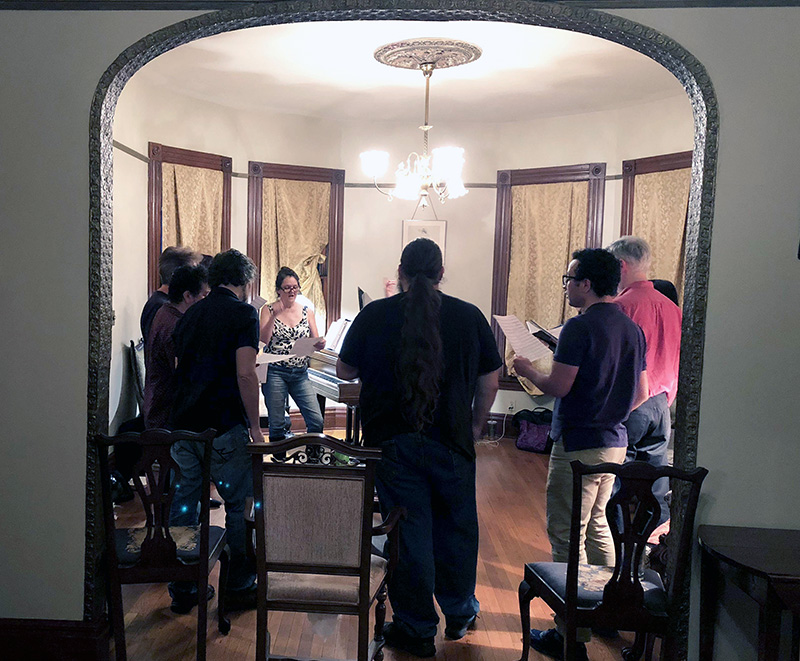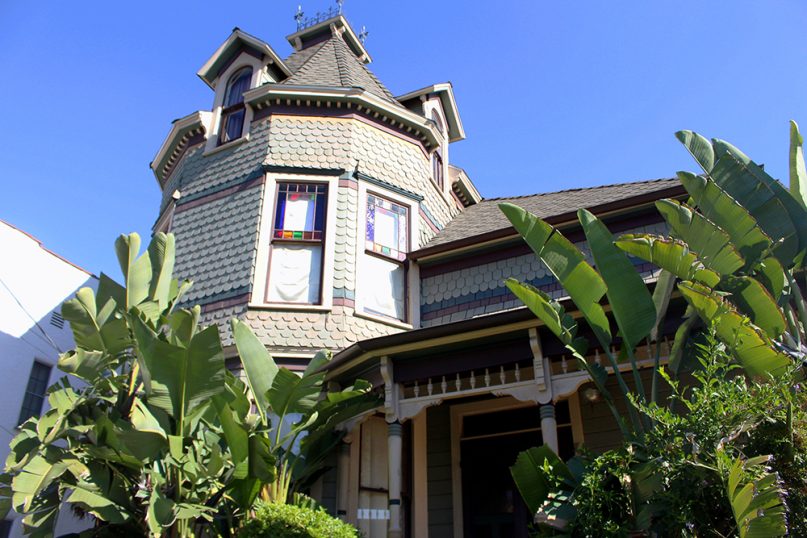LOS ANGELES (RNS) — With dozens of hymnals in her home, Bobbie Kirkhart can often be heard singing sacred songs to herself. But listen closely and you’ll likely notice she’s changed a word or two.
Kirkhart, 75, sees no reason she should abandon the music she grew up with, even if she has left her faith behind. An atheist and the owner of Heretic House, a gathering place for local atheist and freethought groups, she retains an affection for her Christian upbringing.
“We all love our first music,” Kirkhart said. “I don’t believe the lyrics of any hymn more than I believe ‘A man is a two-face, a worrisome thing who’ll leave you to sing the blues in the night.’
“But nobody asks anybody why they sing that,” she adds.
RELATED: Atheist summits aim to find community, and power, in networking nonbelievers
Kirkhart grew up in a devout liberal Protestant family in Enid, Okla. She attended church services, potlucks and even taught Sunday school while attending the University of Oklahoma, where she majored in journalism.
“I loved the church,” she said. “I never stopped loving the church.”
But at some point she realized that the feature she really loved was the “aspect of humanity,” she said.
“My happiest times in the church I think as a child were family nights and the potlucks,” she said. “That has nothing to do with being religious or irreligious; it has to do with needing to be with other people.”

Bobbie Kirkhart started Heretic House in the Los Angeles area after recognizing a need for such a space for atheists and freethought groups to meet. RNS photo by Heather Adams
Heretic House, a Victorian in Angelino Heights that Kirkhart bought in 2009 for the express purpose of hosting other atheists, fills this church-shaped need for Kirkhart without the trappings of belief in a higher power — “kind of like the old church fellowship hall,” said Kirkhart, without the sanctuary.
“We have less opportunity for community, for resources with each other than people in the churches,” she said.
During one weekend in February, the house hosted an Atheists United board meeting as well as an AU game night, a gathering of the local chapter of Freethought Toastmasters, a discussion group composed mostly of atheist and other humanists (in LA, half of them are Catholics) and a rehearsal for Voices of Reason, an atheist choir.
Kirkhart was also hosting at least three people for extended stays as guests.
In short, before there was Heretic House, “there was a need for a place,” Kirkhart says, laughing.
In the past, Secular Student Alliance fundraisers have been held at Heretic House, and the home has served as a temporary shelter to atheists who are adrift. Herb Silverman, founder of Secular Coalition for America, has had a room here, as have Shelley Segal, a singer whose song “Saved” is a rejection of the Christian notion of redemption; Harvard University’s Humanist chaplain, Greg Epstein; 10 of his students; and many more.
At one point, Kirkhart said, she attempted to host a poker night but quickly found out that Los Angeles atheists aren’t big gamblers.
Local atheists say Heretic House is an upgrade from previous meeting places. When Tom Bresnahan, 55, first went to an Atheists United meeting in Los Angeles, it was in an office conference room with acoustic tile ceilings, fluorescent lights and industrial carpet, he said.
But Kirkhart’s generous home has effected a deeper change their community. “That normal kind of social space is the very thing that atheism needs most at this moment in history,” Bresnahan said. “Atheism is in an important transition period right now, from being a radioactively radical philosophical or political position to that of a legitimate social and personal identity.
“The thing about Heretic House is that it’s not just someone’s home, it’s a destination,” said Bresnahan.

The Voices of Reason choir practices in Heretic House, a house in Los Angeles dedicated to hosting and promoting atheist events or groups, on April 22, 2018. RNS photo by Heather Adams
Kirkhart first began asking questions about her faith in high school, but, as everyone she knew was religious, there were few answers that satisfied her. Then, in 1965, she followed a college roommate to Los Angeles and married. Her first husband was more relaxed and fluid about religion, sometimes jumping from one to another, never thinking about it too hard.
“I tried to be like that,” she said. “But I couldn’t.”
Then when her father got cancer, she found herself wanting to pray but didn’t believe a god would listen to her prayers.
She happened to be on vacation in Mazatlan, Mexico. “I went to the beach in the morning and said I’m going to know what I believe when I come home,” Kirkhart said. She wrestled with all her thoughts, beliefs and feelings for six hours.
“Then I came back an atheist,” she said.
It took her six more years before she attended her first Atheists United meeting, but once she took her new orientation public, she jumped in. “I tend to be a person that if I’m into something, I’m into it,” Kirkhart said. “I was fairly active from the beginning.”
She went on to become president and serve on the board of Atheists United, as well as on the advisory board of the Humanist Association of Nepal. She was the president of the Atheist Alliance International and in 2013 received the Freethought Backbone award from the Secular Student Alliance.
Evan Clark, executive director of Atheists United Los Angeles, got connected with Kirkhart and Heretic House when he was running the Secular Student Alliance at California Lutheran University, the only religious university in the country with an atheist club at the time.
Having recently move from Arizona, Clark, 30, appreciates the roof over his head. But it’s much more than just a home, he said; it’s knowing you are part of a community.
“I think people feel it when they walk into a church,” Clark said. “And we feel it when we walk into Heretic House.”
The rituals at the heart of the life at Heretic House are informal, but they still bring solace to those who come for an evening or perch for longer. “I don’t think of it as living here but staying here, as guests,” said Bresnahan, who is staying at the house temporarily with his wife while his own home is renovated. (The couple met at a Heretic House gathering.)
“It’s an oasis,” he said, “filled with comings and goings, songs and chatting, planning things, having parties.” At the same time, he said, “we can just close our bedroom door and have privacy.”
That kind of hospitality is especially gratifying in a world that is a long way from fully accepting atheists. When she first joined Atheists United, many members, including the president, had to use fake names because they feared they’d lose their jobs.
Society has changed, Kirkhart said. “People are much more tolerant, much more open and there are many more of us than people think.”
But atheists still need a place that respects that and doesn’t assume that faith is the norm. “This is here to enable an openness of thought and a freedom of humanity and to help people,” said Kirkhart.
“When people need it, the house is open,” she said.





